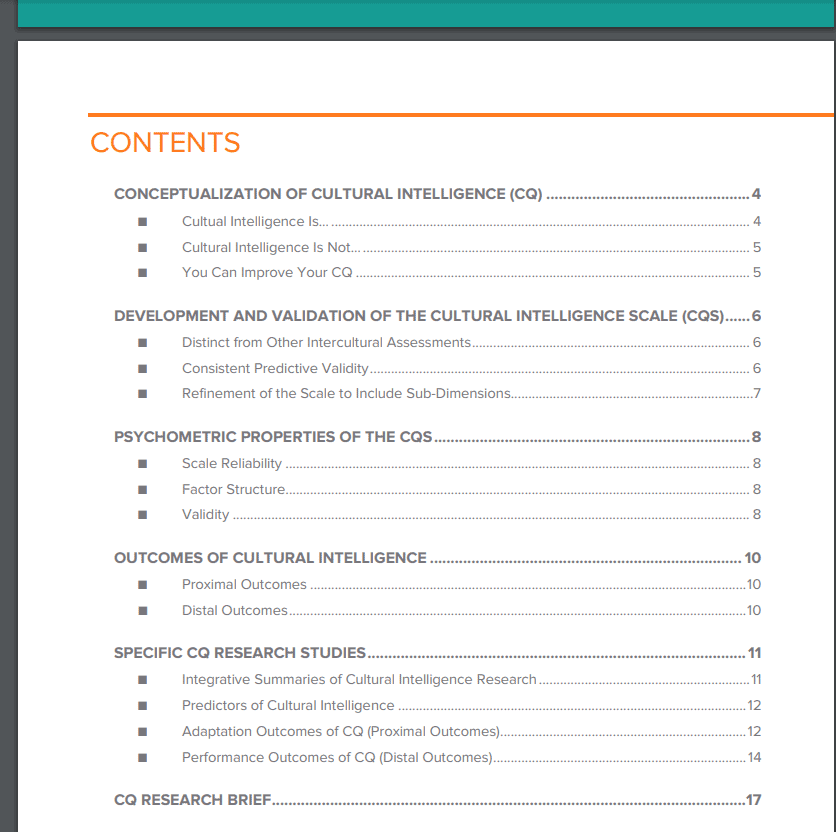How it All Got Started
Cultural Intelligence was first discussed by academics about 25 years ago. Since that time, over 1,000 articles about CQ have been published in scholarly journals.
CQ research has been conducted across more than 150 countries throughout the world and published in over 600 scholarly journals. Scholars across a wide variety of disciplines (management, psychology, diversity and inclusion, leadership, language studies, counseling psychology, etc.) are contributing to CQ research
Many studies by different research teams in different parts of the world show the reliability and validity of the CQ Assessment.
Published peer-reviewed research shows that Cultural Intelligence predicts a wide range of cultural effectiveness outcomes.
Research also demonstrates that Cultural Intelligence interventions help people to enhance their CQ, and this should facilitate cultural effectiveness.

“CQ HAS THE MOST PROMISING EVIDENCE FOR ASSESSING CROSS-CULTURAL COMPETENCE.”
— Matsumoto & Hwang’s critical review of ten cultural competence measures Journal of Cross-Cultural Psychology, July 2013
Request a copy of our Research Guide which describes the CQ research including:
Researchers have used the term ‘cultural values’ in two different ways. For example, the original Hofstede research referred to cultural values at the country level. Research on national cultures showed cross-border differences in the typical approaches to decision-making (collectivistic and individualistic), communication styles (direct and indirect), approaches to uncertainty (low and high low uncertainty avoidance), etc.
More recently, scholars have recognized the diversity of values within cultures and within countries. So today, we find it more useful to recognize these differences and focus on individual level preferences instead of country level preferences. Individual “Behavioral Preferences” provide a non-judgmental, easy to understand way to discuss individual differences. Understanding the preferences of others and adapting to these differences enhances teamwork and improves work performance.
Ang and Van Dyne (2008) expanded upon Earley and Ang’s (2003) original three-factor conceptualization of Cultural Intelligence (motivation, cognition, and behavior) and advanced a four-factor model (motivation = CQ Drive; cognition = CQ Knowledge; metacognition = CQ Strategy; and behavior = CQ Action).
Your level of interest, persistence, and confidence during multicultural interactions.
Your understanding about how cultures are similar and different.
Your awareness and ability to plan for multicultural interactions.
Your ability to adapt when relating and working in multicultural contexts.
Scale development followed rigorous construct development procedures involving multiple development samples over several years. A multicultural team (including members from North American, Europe, and Asia) used data from different cultures and a variety of multicultural teams to assess the psychometric properties of the CQ scale.
Cross-validation replicated the four-factor structure in different samples (e.g., other people in different cultural settings).
Predictive Validity - Published peer-reviewed research shows that Cultural Intelligence predicts adjustment, well-being, cultural judgment and decision-making, task performance, citizenship performance, adaptive
performance, and leadership performance in culturally diverse settings
We offer multiple resources that focus on the research behind Cultural Intelligence.
Request a copy of our Research Guide document which describes the research in more detail and covers the following topics:
Disclaimer: The offer for a complimentary CQ Assessment is contingent upon requesting on behalf of an organization. The Cultural Intelligence Center reserves the right to deny requests for a CQ Assessment. If you are unsure if you meet this criteria, please complete the form above and we will respond within 1-2 business with instructions for how to take your online CQ Assessment or with alternative options for you. If you are a Professor or Student at a College or University, we recommend you check out CQ Assessment options on our sister site www.LearnCQ.com or contact us directly for bulk purchasing options. By providing your email address, you agree to receive occasional promotional emails from the Cultural Intelligence Center. You can op-out of receiving these emails at any time (and still receive a complimentary CQ Assessment).
Meet with one of our Solutions Consultants who can help put together the ideal CQ solution for you or your organization.
30300 Telegraph Road
Bingham Farms, MI
48025
8am – 5pm EST
Now, more than ever, companies need effective leaders at all levels of the organization. Being able to bring together and get the best out of team members from different generations, socio-economic backgrounds, ethnic roots, countries, religions, and educational backgrounds requires a Culturally Intelligent Leader.
We have a collection of Cultural Intelligence leadership articles written by social scientist, speaker, and author Dr. David Livermore. The article topics include:
About the Author

David Livermore, PhD (Michigan State University) is a social scientist devoted to the topics of cultural intelligence (CQ) and global leadership and the author of several award-winning books. Learn more about Dr. David Livermore by visiting his website.
To receive your complimentary CQ for Leaders Packet, please provide your email address below.
By submitting this form, you agree to receive promotional emails from The Cultural Intelligence Center (you can opt-out at any time). We will send you an email with a link to download CQ for Leaders Packet.